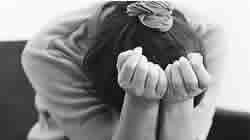Depression - Complementary treatment for depression using social suppport, herbal medicine, home remedy, homeopathy, acupuncture and ayurvedic medicine.
Depression
Social Support for Depression
Herbal Medicine for Depression
Home Remedy for Depression
Homeopathy for Depression
Chinese Medicine for Depression

Complementary and Alternative Treatment for Depresseion
|
|
 |
| Social Support for Depression |
Social Support
Human beings are social animals, People needs another human being for help and support especially for stressed and depressed persons. Studies have shown that well-developed social networks helped reduce the symptoms of depression.
To know more about social support groups, contact National Foundation for Depressive Illness. You can look and obtain the organization's toll-free number by calling toll-free directory assistace.
|
|
 |
| Herbal Medicine Treatment for Depression |
Herbs
While many herbal remedies have been used traditionally to treat depression, the most substantial amount of scientific research has involved the following herb:
St. John's wort (Hypericum perforatum)
Several studies indicate that St. John's wort effects the brain chemistry which may be as effective as tricyclic antidepressants, but with known fewer side effects.
Known side effect of St. John's wort;
- gastrointestinal complaints,
- fatigue, and
- oversensitivity to sunlight.
The recommended dose is about 300 milligrams three times a day. However, because of potential adverse interactions, St. John's wort should not be taken in conjunction with other antidepressants or with certain medications, including indinivir (a protease inhibitor used for HIV), oral contraceptives, theophylline, warfarin, digoxin, reserpine, cyclosporine, and loperamide.
Although they have yet to be scientifically evaluated for their use in treating depression, the following are a few examples of herbs that may be recommended by professional herbalists for depression or its related symptoms:
- Ginko. Ginko is known to improve the flow of blood to the brain normalizing the levels of brain chemicals that are associated with depression. (Recommended dose is 240 milligrams per day.)
- Valerian root (Valerian officinalis) may improve symptoms of insomnia associated with depression
- Damiana (Turnera diffusa) may reduce sexual dysfunction associated with many antidepressant medications
- Ginseng (Panax ginseng)—may help the body resist stress
|
|
 |
| Homeopathy Treatment for Depression |
Homeopathy
Very few studies has been done to determine the effectiveness of specific homeopathic therapies for depression. However, professional hemeopaths may prescribe the appropriate treatment based on their knowledge and experience. The constitutional type of the person is taken which may define the person's physical, emotional, and psychological makeup. With due consideration from these factors, the following may be prescribed; Causticum, Gelsemium, Ignatia, Kali phosphoricum, Natrum muriaticum, Ignatia, Pulsatilla, Sepia, and Zincum metallicum.
|
|
 |
| Chinese Medicine Treatment for Depression |
Chinese medicine practitioners attribute depression from the suppression of qi. Qi has to be freed to treat depression. Herbal formulas are that are used to treat depression include rehmannia root, diocorea root, conus fruit, and poria fungus. Other herbal preparations that can also be used contain schisandra fruit, ziziphus seed, and Chinese angelica.
Acupuncture
Clinical trials suggest that electroacupuncture may reduce symptoms of depression as effectively as tricyclic antidepressant medication. Electroacupuncture involves the application of a small electrical current through acupuncture needles. Other studies suggest that acupuncture may be effective for people with mild depression and for those with depression related to a chronic medical illness. Consult your acupunturist for more details.
Acupressure
If you may want, you may try the following acupressure treatment. Apply a steady acupuncture pressure for three minutes at the following areas;
Extra Point Yin Tang. located just above the nose, exactly between the eyebrows.
Liver 3, situated on tope of the foot in the webbing between your big toe and second toe.
Large Intestine 4, located on the back of your hand where the bones of your thumb and index finger meet.
Kidney 7, located on your inner leg, two thumbs-widths above your anklebone.
Stomach 36, located four-finger-widths below your kneecap and one finger-width toward the outside of your shinbone.
| Related News and Articles for Depression |
|